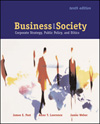 |  Business and Society: Corporate Strategy, Public Policy, Ethics, 10/e James Post,
Boston University
Anne T Lawrence,
San Jose State University
James Weber,
Duquesne University
Employees and the Corporation
Chapter Summary- U.S. labor laws give most workers the right to organize unions and to bargain collectively with their employers. Some believe that unions are poised for resurgence after many years of decline.
- Job safety and health concerns have increased as a result of rapidly changing technology in the workplace. Employers must comply with expanding OSHA regulations and respond to the growing trend toward violence at work.
- Employers' right to discharge at will has been limited, and employees now have a number of bases for suing for wrongful discharge. The expectations of both sides in the employment relationship have been altered over time by globalization, business cycles, and other factors.
- Employees' privacy rights are frequently challenged by employers' needs to have information about their health, their work activities, and even their off-the-job lifestyles. When these issues arise, management has a responsibility to act ethically toward employees while continuing to work for a high level of economic performance.
- Blowing the whistle on one's employer is often a last resort to protest company actions considered harmful to others. It can usually be avoided if corporate managers encourage open communication and show a willingness to listen to their employees.
- The growing globalization of business has challenged companies to adopt fair labor standards to ensure that their products are not manufactured under substandard, sweatshop conditions.
|
|




 2002 McGraw-Hill Higher Education
2002 McGraw-Hill Higher Education